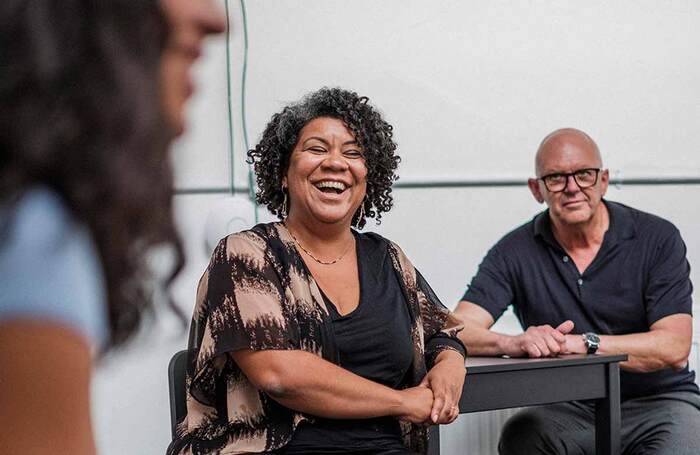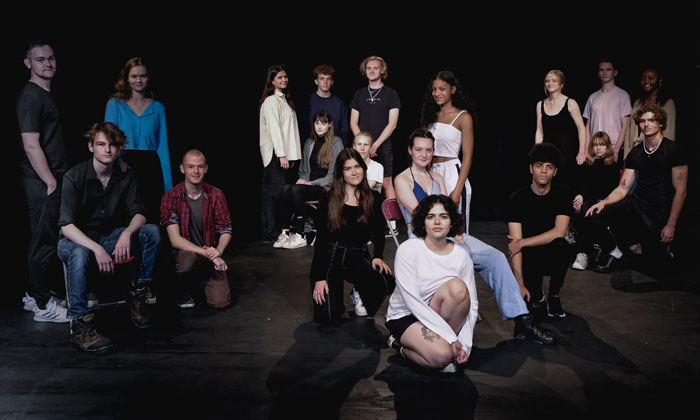Bristol School of Acting: ‘We encourage students to find their unique voice’
As the UK’s newest drama school, Bristol School of Acting ensures graduates of its stage and screen degree courses are fully equipped for a performing arts career, with expert training in cutting-edge techniques and technology
What will the performing arts of the future look like? How will actors construct a career? Who will make the industry-defining innovations?
At Bristol School of Acting – the UK’s newest drama school – students are taught that they are the ones with the power to make positive changes in the world of theatre, TV and film. They learn that they can create the cultural climate, whoever they are and wherever they come from.
“The word empowerment gets thrown around a lot, but it really is so important,” says Nancy Medina, BSA’s joint artistic director. “Of course, we will train our students to be excellent actors, prepared for any challenge that comes their way, but beyond that, we want to give them the confidence to create the performing arts world that they want to see.”
The performing arts world has changed dramatically in the past 10 years – and even more so during the coronavirus pandemic – and the role of the actor has changed with it. There is a demand, says Medina, for training programmes that reflect that change, and produce actors prepared for the industry as it is today, not the industry as it was a decade ago.
This September, Bristol School of Acting welcomed its first cohort of students on its new degree courses: the BA (hons) Acting for Screen and the BA (hons) Acting for Stage and Screen. Both courses have been especially designed to provide aspiring actors with the skills they need to succeed in the contemporary, post-coronavirus performing arts.
The BA (hons) Acting for Screen is a three-year programme, developed by acclaimed American actor and experienced tutor Matthew Humphreys, who ran a similar course at New York’s prestigious Pace University, and Charlie Cox, star of Netflix’s Daredevil and patron of Bristol School of Acting.
‘We will train our students to be excellent actors, but we also want to give them the confidence to create the performing arts world they want to see’
The emphasis is to make sure that students graduate already feeling comfortable and competent with cutting-edge techniques and technology. With the timing and financial constraints of the modern screen industries, explains Medina, producers need adaptable actors, capable of quickly finding their feet on film sets – and that is exactly what Bristol School of Acting will provide.
Students on the Acting for Screen programme will receive an average of more than 25 contact hours a week with industry experts every week, and leave Bristol School of Acting having spent three years appearing in professionally directed films, with a professional showreel, and invaluable experience in emerging areas like motion capture and augmented reality. They will be, says Medina, “a producer’s dream”.
The BA (hons) Acting for Stage and Screen, meanwhile, is an intensive, accelerated, two-year course. Extended terms, with 40 weeks of teaching per year, mean that students receive the same number of contact hours as on a three-year course but save thousands of pounds in tuition fees and living costs.
The concept, explains Medina, is that students will learn their techniques in the first year, then spend the second year in production at Bristol’s Tobacco Factory Theatres alongside classes developing those techniques. It is Tobacco Factory Theatres’ resident company-in-training – the first company of its kind in the country.
Continues...
In addition to this invaluable opportunity, students on the BA Acting for Stage and Screen programme will have the chance to train abroad, thanks Bristol School of Acting’s relationship with the internationally renowned Boris Shchukin Theatre Institute, formerly the Moscow Arts Theatre’s Third Studio. Travel restrictions permitting, says Medina, students will have the chance to study for four weeks at one of the world’s leading centres for actor training.
Both the BA (hons) Acting for Screen and the BA (hons) Acting For Stage and Screen are validated by Bath Spa University. When students are not busy in Bristol’s film and TV studios, Tobacco Factory Theatres, or the Boris Shchukin Theatre Institute, they will be taught at professional facilities in central Bristol, at the heart of one of the country’s most vibrant cultural scenes and liveliest student populations.
“There’s the Bristol Old Vic, the Wardrobe Theatre and the Trinity Centre,” says Medina. “Bristol has so much to offer for students and artists alike. So much exciting stuff happens here – and London is only a couple of hours away by train. There is a real sense of community, both in the city and in the school.”
The school is led by Humphreys, Medina – an acclaimed director herself, soon to take the reins of Trouble in Mind at the National Theatre – and her co-artistic director Stuart Wood, one of the most respected acting tutors in the country. They are supported by a faculty of experienced staff, and a range of visiting professional actors, agents, producers, playwrights and more.
‘Bristol has so much to offer for students and artists – and London is only a couple of hours away by train’
At the core of everything are the students, Medina emphasises: their needs, their inspirations, their aims and their ambitions.
“At Bristol School of Acting, we want to introduce a progressive teaching agenda that encourages students to find their unique voices and help them to find the best way of expressing themselves,” she says. “Those are the actors I like working with the most, as a director. Actors who are genuine. Actors who are authentic. Actors who understand who they are and what they are doing.”
Applications to attend can be made via UCAS, with auditions taking place via online and in-person sessions around the country. Bristol School of Acting prides itself on being welcoming, inclusive, diverse, Medina says – and on cultivating those values in its students as well.
“My hope is that we don’t just end up with excellent actors, but with people who can change our industry for the better,” she says. “Our graduates will be those who dismantle the hierarchies that have created the structural exclusion that shapes Western teaching and the industry at large. They will be the ones who redefine the performing arts industries through inclusivity, social justice, imagination and artistic activism.”
See Bristol School of Acting website for further information: bristolschoolofacting.com
The Big Idea
The Big Idea
Most Read
Across The Stage this weekYour subscription helps ensure our journalism can continue
Invest in The Stage today with a subscription starting at just £5.99






